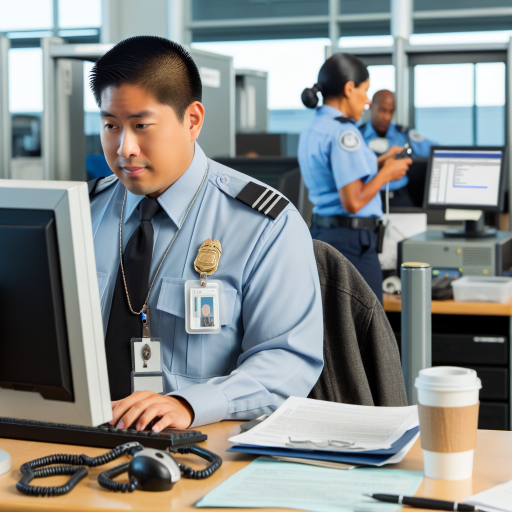Introduction:
A Port Operations Manager plays a crucial role in overseeing the daily activities at a port.
They ensure efficiency and smooth operations.
Their responsibilities include managing cargo handling, vessel scheduling, and ensuring compliance with safety regulations.
Coordinating with shipping lines is vital for the success of port operations.
This coordination helps streamline processes, optimize resources, and enhance overall performance.
Responsibilities of a Port Operations Manager
As a Port Operations Manager, you have a pivotal role in ensuring the smooth operation of port activities.
Your responsibilities involve overseeing various aspects of port operations to ensure efficiency, safety, and compliance with regulations.
Overseeing Daily Operations at the Port
One of the primary responsibilities of a Port Operations Manager is to oversee the day-to-day activities at the port.
This involves coordinating with various departments and personnel to ensure smooth operations.
From managing vessel arrivals and departures to facilitating cargo handling processes, you will be responsible for ensuring that all operations run smoothly and efficiently.
This requires effective coordination and communication with different stakeholders involved in port operations.
Managing Cargo Handling and Storage
Managing cargo handling and storage at the port is another crucial aspect of your role.
This includes overseeing the loading and unloading of cargo, as well as ensuring proper storage and security of goods.
You will need to implement efficient cargo handling processes to minimize delays and ensure timely delivery of goods.
This involves coordinating with shipping lines, trucking companies, and other vendors to streamline the flow of cargo in and out of the port.
Ensuring Compliance with Safety Regulations
Compliance with safety regulations is a top priority for any port operations manager.
You will be responsible for ensuring that all port activities adhere to safety standards and regulations set by regulatory authorities.
This requires conducting regular safety audits, implementing safety procedures, and providing training to port staff on safe handling practices.
By maintaining a safe working environment, you can mitigate risks and prevent accidents that could disrupt port operations.
Supervising Port Staff and Equipment
Supervising port staff and equipment is another critical responsibility of a Port Operations Manager.
Transform Your Career Today
Unlock a personalized career strategy that drives real results. Get tailored advice and a roadmap designed just for you.
Start NowYou will be tasked with managing a team of port workers, including stevedores, crane operators, and other personnel involved in port operations.
Additionally, you will oversee the maintenance and upkeep of port equipment, such as cranes, forklifts, and conveyor systems.
Ensuring that all equipment is in good working condition is essential for the smooth operation of the port and the efficient handling of cargo.
Coordinating with Shipping Lines in Port Operations Management
Coordinating with shipping lines is a crucial aspect of port operations management.
The seamless collaboration between port managers and shipping lines is essential for the smooth functioning of the port.
It also ensures the timely delivery of goods.
In this post, we will explore the importance of coordinating with shipping lines in detail.
Ensuring Efficient Vessel Turnaround Times
One of the key responsibilities of a port operations manager is to ensure swift vessel turnaround times.
By coordinating effectively with shipping lines, the port can streamline the arrival and departure of vessels.
This collaboration minimizes delays and optimizes operational efficiency.
Managing Berthing Schedules
Effective coordination with shipping lines is essential for managing berthing schedules at the port.
By closely working with shipping lines, port managers can allocate berths strategically.
This also helps prioritize vessel arrivals and prevent congestion in the port area.
Coordinating Cargo Handling Operations
Another critical aspect of coordinating with shipping lines is managing cargo handling operations.
By collaborating with shipping lines, port managers can streamline the loading and unloading of cargo.
This collaboration optimizes storage space and ensures the efficient movement of goods within the port.
Communicating with Shipping Lines Regarding Port Updates and Issues
Clear and continuous communication with shipping lines is vital for conveying port updates.
This communication also addresses any issues that may arise.
By maintaining open channels of communication, port managers can keep shipping lines informed about port conditions.
Additionally, they can update shipping lines about delays and other relevant information.
Transform Your Career Today
Unlock a personalized career strategy that drives real results. Get tailored advice and a roadmap designed just for you.
Start NowGain More Insights: Understanding Material Handling Processes
Building relationships with shipping lines:
- Establishing open lines of communication
- Collaborating on operational planning
- Resolving conflicts and addressing challenges together
- Developing trust and mutual respect
Establishing open lines of communication
As a port operations manager, it is essential to have clear and direct communication channels with shipping lines.
Building relationships starts with effective communication to ensure that all parties are on the same page.
Regular meetings, emails, and phone calls can help in maintaining open lines of communication.
It is important to keep shipping lines informed about any changes or issues that may arise during port operations.
By being transparent and proactive in communication, you can strengthen the relationship with shipping lines and build trust over time.
This will ultimately lead to smoother operations and better collaboration.
Collaborating on operational planning
Collaboration is key in managing port operations effectively.
Working closely with shipping lines to plan and coordinate activities can help streamline processes and avoid delays or bottlenecks.
By involving shipping lines in operational planning, you can benefit from their expertise and insights into their specific requirements and preferences.
This collaboration can lead to more efficient operations and improved overall performance.
Engaging shipping lines in the planning process can also help in identifying potential issues or challenges early on and finding solutions together.
This proactive approach can result in better outcomes and stronger partnerships.
Resolving conflicts and addressing challenges together
Conflicts and challenges are inevitable in the shipping industry, but how they are resolved can make a significant difference in the relationship between port operators and shipping lines.
Addressing issues in a timely and professional manner is crucial.
When conflicts arise, it is important to approach them with an open mind and a willingness to find mutually beneficial solutions.
Working together to resolve challenges can strengthen the relationship and build trust between parties.
By maintaining a collaborative and solution-oriented mindset, you can turn conflicts into opportunities for improvement and growth.
Building a culture of cooperation and teamwork can help in overcoming obstacles and achieving common goals.
Developing trust and mutual respect
Trust and mutual respect are the foundation of any successful partnership.
Transform Your Career Today
Unlock a personalized career strategy that drives real results. Get tailored advice and a roadmap designed just for you.
Start NowAs a port operations manager, it is important to cultivate a culture of trust and respect with shipping lines to ensure a positive and productive working relationship.
Consistency, reliability, and transparency are key factors in building trust.
By delivering on your commitments and being honest and forthcoming in your interactions, you can earn the trust of shipping lines and foster a sense of mutual respect.
Respectful communication, active listening, and empathy can also help in developing strong relationships based on trust and understanding.
Showing appreciation for the expertise and contributions of shipping lines can further strengthen the bond between parties.
Explore Further: Material Handler Jobs: Where to Find Them
Challenges Faced by Port Operations Managers in Coordinating with Shipping Lines
Port operations managers play a crucial role in the smooth functioning of ports by coordinating with shipping lines.
This coordination involves various challenges that managers must navigate effectively to ensure efficient operations.
Dealing with Unexpected Changes in Schedules
- Shipping schedules are often subject to changes due to weather conditions, mechanical issues, or other unforeseen circumstances.
- Port operations managers must be prepared to adapt to these changes quickly and efficiently to avoid disruptions in port operations.
- Communication with shipping lines is key in addressing unexpected schedule changes and ensuring minimal impact on port activities.
Managing Competing Demands from Multiple Shipping Lines
- Port operations managers often have to juggle competing demands from multiple shipping lines using the same port facilities.
- Efficient allocation of resources, such as berths and cargo handling equipment, is essential to meet the needs of all shipping lines.
- Effective communication and negotiation skills are crucial in managing conflicting priorities and ensuring fair access to port services.
Balancing Operational Efficiency with Cost Considerations
- Port operations managers face the challenge of balancing operational efficiency with cost considerations to remain competitive in the market.
- Optimizing port processes, such as container handling and customs clearance, is vital to minimize costs and improve efficiency.
- Finding the right balance between operational performance and financial constraints is essential for sustainable port operations.
Addressing Issues Related to Delays or Disruptions
- Delays and disruptions in port operations can have a significant impact on shipping lines and port stakeholders.
- Port operations managers must proactively address issues such as congestion, equipment breakdowns, or labor disputes to minimize disruptions.
- Implementing contingency plans and communication strategies is crucial to effectively manage unexpected delays and maintain port efficiency.
Port operations managers face various challenges in coordinating with shipping lines, ranging from dealing with unexpected changes in schedules to managing competing demands and addressing operational issues.
By effectively managing these challenges, port operations managers can ensure smooth and efficient operations, ultimately benefiting both shipping lines and the overall port ecosystem.
See Related Content: Material Handler Job Satisfaction Factors

Strategies for effective coordination with shipping lines:
- Regular meetings and communication
- Utilizing technology for real-time updates and tracking
- Working closely with other port stakeholders
- Implementing contingency plans for potential issues
Regular meetings and communication
Effective coordination with shipping lines starts with regular meetings and open communication channels.
By establishing a consistent schedule for meetings, port operations managers can ensure that all parties involved are on the same page and updated on any developments or changes in operations.
These meetings provide an opportunity to address any concerns, discuss upcoming plans, and collaboratively problem-solve any challenges that may arise.
By fostering a culture of transparency and proactive communication, port operations managers can build strong relationships with shipping lines and enhance the overall efficiency of port operations.
Utilizing technology for real-time updates and tracking
In today’s digital age, technology plays a crucial role in facilitating effective coordination with shipping lines.
Port operations managers can leverage advanced tracking systems, online platforms, and communication tools to receive real-time updates on vessel status, cargo movements, and other critical information.
By harnessing the power of technology, port operations managers can streamline communication, monitor operations more efficiently, and make informed decisions based on accurate data.
This proactive approach not only enhances coordination with shipping lines but also improves overall operational effectiveness and customer satisfaction.
Working closely with other port stakeholders
Collaboration is key to successful coordination with shipping lines.
Transform Your Career Today
Unlock a personalized career strategy that drives real results. Get tailored advice and a roadmap designed just for you.
Start NowPort operations managers should work closely with other port stakeholders, including terminal operators, customs officials, and logistics providers, to ensure seamless coordination across all aspects of port operations.
By fostering strong relationships with these stakeholders and promoting a collaborative working environment, port operations managers can enhance overall efficiency, minimize delays, and address any issues that may arise promptly.
This coordinated effort benefits not only shipping lines but also the entire port ecosystem, leading to improved performance and customer satisfaction.
Implementing contingency plans for potential issues
Despite meticulous planning and coordination, unforeseen issues may still arise in port operations.
To effectively manage these challenges and maintain smooth coordination with shipping lines, port operations managers should have robust contingency plans in place.
By identifying potential risks, developing alternative strategies, and conducting regular drills, port operations managers can mitigate disruptions, address emergencies effectively, and minimize the impact on shipping lines and overall port operations.
Proactive preparation and swift response to contingencies demonstrate professionalism, enhance trust with shipping lines, and ensure the continuity of operations even in challenging situations.
Discover More: Material Handler Resume: Tips and Examples
Case studies of successful coordination between Port Operations Managers and shipping lines:
Port of Singapore: Known for its efficient operations and quick turnaround times.
Port of Rotterdam: Utilizes advanced technology to streamline processes.
Port of Los Angeles: Focuses on collaboration and effective communication.
Examples of ports with streamlined operations and efficient turnaround times:
Port of Busan: Implements strategic planning for smooth operations.
Port of Hamburg: Invests in infrastructure for faster cargo handling.
Port of Shanghai: Embraces automation to increase efficiency.
Testimonials from shipping lines about effective communication and collaboration:
“Working with Port Operations Managers has improved our service levels.” – Global Maritime Shipping
“The collaboration with ports has reduced our vessel waiting times significantly.” – Oceanic Transport Co.
“Clear communication has helped us better plan our schedules and optimize resources.” – TransOcean Line
Lessons learned from past challenges and how they were addressed:
Communication breakdowns: Implemented regular meetings to ensure alignment.
Inefficient processes: Invested in training programs to improve efficiency.
Capacity constraints: Expanded infrastructure to accommodate growing demand.
Transform Your Career Today
Unlock a personalized career strategy that drives real results. Get tailored advice and a roadmap designed just for you.
Start NowRole of a Port Operations Manager
Recap of the role of a Port Operations Manager: The Port Operations Manager plays a crucial role in ensuring the smooth functioning of port activities.
Emphasis on the importance of coordinating with shipping lines for successful port operations: Building strong relationships with shipping lines is essential for efficient and effective port management.
Call to action for Port Operations Managers to prioritize relationship-building with shipping lines: It is imperative for Port Operations Managers to prioritize communication and collaboration with shipping lines to enhance operational efficiency and overall success.
By fostering partnerships and maintaining open lines of communication, port operations managers can streamline processes, minimize delays, and improve overall performance.
It is a key aspect of their role that should not be overlooked.




